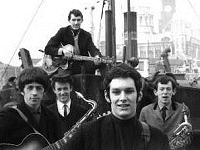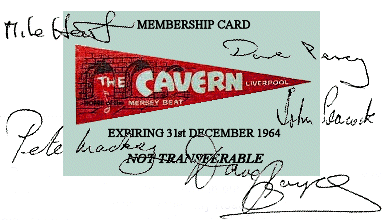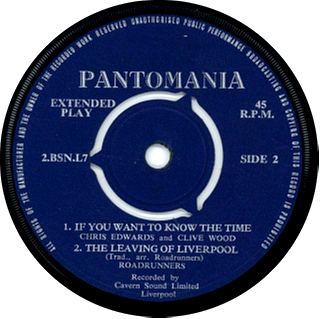


|
 |
|
    |
As far as much of the Sixties music world was concerned,
the Liverpool music scene was 'Merseybeat' and The Beatles while London
was R&B and The Rolling Stones..... yes, there were many more centres,
groups and musical genres than that but, just for a moment, let's take Liverpool
and R&B..... put them together and what do you get? Many more fab groups
which, although not represented by huge chart success, were incredibly popular
locally and abroad and who were creating cutting edge music and a sound
all of their own. The cream of these were The Roadrunners, a group who featured regularly in Merseyside polls of favourite groups and who performed alongside The Rolling Stones, The Beatles in 'The Cavern Club' and also at the legendary 'Star Club' in Hamburg, Germany alongside many other Sixties legends such as The Tornados. If you are at all interested in the Sixties music scene, the Roadrunners' website is an absolute must - not only to gain a better understanding and knowledge of the group itself, other great but little-known local acts of the Sixties Merseyside scene and to view some great images, but also to look through a window on the musical and social culture of the time. There are a lot of personal reminiscences and stories, including interviews with legendary Sixties personalities such as Cavern DJ Bob Wooler, who sadly died in 2002. Click on the title or the images on the left (better copies appear on their site) to visit this musical goldmine. By kind permission of original group drummer David Boyce, here are some entertaining and illuminating reminiscences and comments by him on the group, the scene and the greatest musical decade of all time....... I'm David Boyce or, as I was known between August 1962 and August 1965, Dave Boyce. I was the drummer with the Roadrunners. I don't think it is insignificant that, of all the other erstwhile Roadrunners, now in our late 50s, the then Pete Mackey is now Peter and Dave Percy is David. John Peacock is still John, but he was never Johnny, Jonno or Jack. Mike Hart was the only Roadrunner to spend the whole of his working life as a musician but, in any case, in Roadrunner days he was always known as Henry. It may seem perverse to start this account of my involvement with the Roadrunners and the Rhythm & Blues scene in Liverpool in the early 60s with a discourse on the use of names. But it isn't. If one ignores the race and class divisions of pre-Beatles Britain one gets a distorted view of subsequent developments in popular music. The Roadrunners were white, middle-class, grammar school/college-educated boys who, like the Beatles, had been brought up "beneath the blue suburban skies". If you research the backgrounds of the founding members of most of the young, white, London-based R&B outfits, you'll find a very similar pattern which nearly always includes an Art School. Pete Mackey (bass) was the President of the Students Union of the same Liverpool College of Art which had been attended a couple of years earlier by John Lennon. In 1962, when the Roadrunners were formed from the nucleus of a short-lived pop group called the Tenabeats, there was no white R&B scene in Liverpool in the sense that there was an emergent scene in London centred on the activities of the rather older jazz-blues guitarist Alexis Korner. There was, of course, a genuine black blues music scene emanating from the many small drinking clubs in the Upper Parliament Street area, but these were seldom if ever visited by the young music fans of any persuasion, and had little effect on the jazz, blues or pop music preferred by white youths, this being "stolen" from American recordings. The New Orleans or "Trad" jazz which, before 1962, was the preferred listening of the majority of university of college students was, for the most part, dispensed by woolly-jumpered, white-bearded ex-students who displayed extreme prejudice towards anything which was electrically amplified and, therefore, "inauthentic". In those days, there was a definite divide between the music which middle and working class white youth was supposed to like. |
 |
 |
The
Country & Western thing in Liverpool is quite interesting. If R&B started
out being working class and jazz middle class, C&W occupied a curious middle
ground because of the Irish connection. Since the middle of the 19th century,
Liverpool had played host to a vast Irish immigrant population, both Catholic
and Protestant. The Irish folk music which had been exported to the United
States by the brothers, sisters and cousins of the Liverpool settlers metamorphosed
into one strand of American country music, was electrified into country
& western, and subsequently re-imported into Irish communities throughout
Britain over a hundred years later. If you went into any Liverpool Irish pub in the late 50s, the songs of Hank Williams and Patsy Cline were being performed alongside the traditional jigs and reels. Pete Mackey came from an Irish Catholic background as, indeed, did Paul McCartney. Because of the "folk" connection, country groups became acceptable as interval bands in jazz clubs like the "Mardi Gras" as they were for the most part acoustic and barely distinguishable from the "Trad" offshoot skiffle. The most successful of these groups was the Blue Genes who re-invented themselves several times before becoming the Merseybeat group the Swinging Blue Jeans as a direct copy of the Beatles. The Blue Genes in their first incarnation became resident at the Mardi Gras and subsequently the Cavern jazz club (as it was then), and it was they who first got the Beatles in on one of their guest nights. The Mardi Gras never did let full-blown rock groups in, but the Roadrunners did become regulars there and at its sister club the Downbeat because of our tenuous jazz/art connections.. We were, in fact, the first electric band of any kind to play the Downbeat which, until then, had specialised in a rather more rarefied "modern" and "mainstream" type of jazz. It must seem odd to the present day music fan, where fusion, cross-over and World music is the norm, to conceive of a time when support for a particular musical style could be as partisan as today's support of a football team. Although the Roadrunners did nail their colours to the R&B mast, in reality our performances reflected the diverse tastes of the constituent members. I liked the Dutch Swing College Band, Louis Jordan's Tympani Five and Little Richard's backing band the Upsetters and when I listen to the few 37-year-old Roadrunner tracks which escaped, I can hear my youthful attempts at emulation, especially on "Mojo". I can also hear my Army Cadet Band training on Beautiful Delilah! As for the others, they must speak for themselves, but I'm sure I can hear a trace of English folk music in Dave's guitar plucking solos and Johnny Phillips, our one-time American tenor sax player, can't disguise the modern jazz, Berkeley School of Music, influence in his solo on "Mojo" and flute work on "Cry, Cry, Cry". It was the superior musicianship of this seventeen year old from South Carolina which gave the second incarnation of the Roadrunners its much tighter and more arranged feel. Before I met Johnny, I didn't know what a syncopated triplet was! There are several on "Have you ever had the blues?" which Johnny sings as well as providing the trumpet solo with its amazing final high note. After our first visit to Hamburg in 1963/4, Henry insisted on changing the line-up and expanding the repertoire as a direct result of playing nightly alongside the horn-based Glasgow band the Bobby Patrick Big Six. By early to mid 1964, loads of groups were jumping on the R&B bandwagon, so we had to move on. Despite appearing at the "First British R&B Festival" in Birmingham in February (alongside Sonny Boy Williamson, the Yardbirds, Long John Baldry and the Spencer Davis Group with Steve Winwood) Henry felt that wailing harmonicas were becoming a cliche. |
|
|
All
Original Material Copyright SixtiesCity
Other individual owner copyrights may apply to Photographic Images |